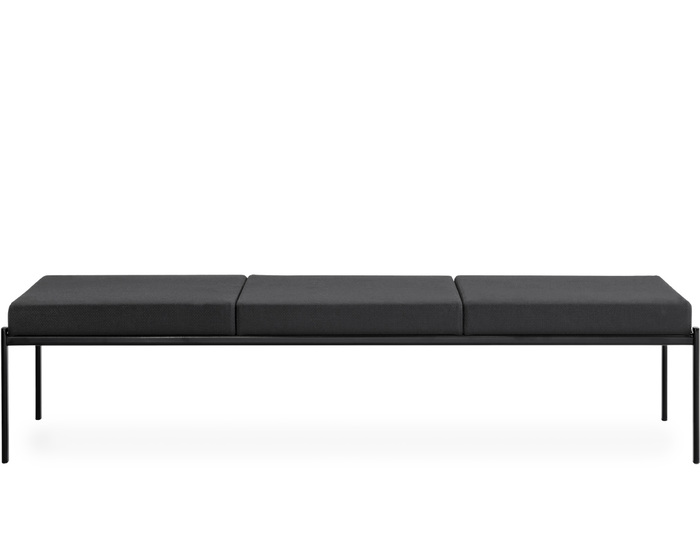kiki 3-seater bench
by Ilmari Tapiovaara from Artek - sale
kiki 3-seater bench
Design Ilmari Tapiovaara, 1960
Lacquered steel frame, birch plywood, PU foam & Dacron, upholstery
Made in Finland by Artek
Tapiovaara wanted to design inexpensive furniture for a broader audience. He made use of materials that were readily available in Finland in the 1940s, such as solid birch. Later in the 1950s, he began to develop multipurpose chairs made of steel tubing and plywood.
Ilmari Tapiovaara designed Kiki in 1960. It was originally conceived as a chair whose stackability allowed it to be used to seat large groups, such as in auditoriums. In the Kiki series Tapiovaara employed a more clean cut design idiom instead of the more organic style he had favored previously. Instead of wood, he chose oval steel tubing as the structural and unifying element of the whole Kiki collection. Kiki was a success, establishing the current direction for furniture design at this time. Kiki's timeless and elegant design idiom has made it one of the most popular pieces of public furniture in Finland.
llmari Tapiovaara was one of the greatest interior architects and designers of his era. With the mind of an explorer and a soul of a craftsman, Tapiovaara was always seeking for new solutions to improve everyday objects. During his long career Tapiovaara created dozens of iconic objects loved by the public. He was revered as a master of characteristic and human objects and surroundings who captured the essence of Finnish identity. Ilmari Tapiovaara was awarded a total of six gold medals at the Milan Triennials as well as many other important awards throughout his career.
3-seater bench: 68.1" w | 21.3" d | 15.4" h
Lacquered steel frame, birch plywood, PU foam & Dacron, upholstery
Made in Finland by Artek
Tapiovaara wanted to design inexpensive furniture for a broader audience. He made use of materials that were readily available in Finland in the 1940s, such as solid birch. Later in the 1950s, he began to develop multipurpose chairs made of steel tubing and plywood.
Ilmari Tapiovaara designed Kiki in 1960. It was originally conceived as a chair whose stackability allowed it to be used to seat large groups, such as in auditoriums. In the Kiki series Tapiovaara employed a more clean cut design idiom instead of the more organic style he had favored previously. Instead of wood, he chose oval steel tubing as the structural and unifying element of the whole Kiki collection. Kiki was a success, establishing the current direction for furniture design at this time. Kiki's timeless and elegant design idiom has made it one of the most popular pieces of public furniture in Finland.
llmari Tapiovaara was one of the greatest interior architects and designers of his era. With the mind of an explorer and a soul of a craftsman, Tapiovaara was always seeking for new solutions to improve everyday objects. During his long career Tapiovaara created dozens of iconic objects loved by the public. He was revered as a master of characteristic and human objects and surroundings who captured the essence of Finnish identity. Ilmari Tapiovaara was awarded a total of six gold medals at the Milan Triennials as well as many other important awards throughout his career.
3-seater bench: 68.1" w | 21.3" d | 15.4" h
Ilmari Tapiovaara
Ilmari Tapiovaara was always seeking new solutions to improve everyday objects. He was revered as a master of quality and created objects which captured the essence of Finnish design identity.
Artek was founded in 1935 by Alvar and Aino Aalto with an idea to promote a modern culture of habitation. Artek advocates a new environment of art and design for everyday life.









 write a review now
write a review now
